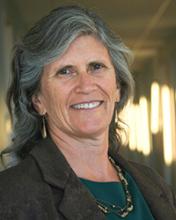Campus Ombuds Brings Resolve to New Office
 After serving five years as assistant dean for the School of Natural Sciences, Deidre "De" Acker stepped into a new role over the summer as UC Merced's founding campus ombuds.
After serving five years as assistant dean for the School of Natural Sciences, Deidre "De" Acker stepped into a new role over the summer as UC Merced's founding campus ombuds.
Acker's appointment began July 16 after a national search. The Office of Ombuds Services is a resource available to UC Merced students, staff, faculty, lecturers and postdoctoral scholars. The office and ombuds abide by four guiding tenets: confidentiality, neutrality, informality and independence.
"The purpose of the office is to provide a positive working, learning and living environment at UC Merced," Acker said. "My role is to provide confidential and informal dispute resolution. Anyone can come to me about any complaint, concern or conflict related to the university. The services we provide are always voluntary. No one is forced to come."
While the ombuds position and office are new at UC Merced, their concepts have been around for centuries. Sweden established the first independent ombuds position during the 1800s as a way to help its people resolve issues with the government and navigate its bureaucratic systems.
Becoming campus ombuds marks a return to familiar territory for Acker, who has 15 years of experience as a trained mediator. Before joining UC Merced, Acker helped UC Santa Barbara create its mediation program, which trained faculty and staff to serve as mediators. As the School of Natural Sciences' assistant dean, she continued to utilize her negotiation and problem-solving skills on the school’s behalf.
Acker recently spoke to Panorama about her new role and the ombuds office.
What kinds of issues can the campus ombuds and the Office of Ombuds Services assist with?
For faculty and staff, things such as interpersonal conflicts someone may have with a supervisor, peer or colleague or questions about university policies and procedures. Someone may come if they disagree with their annual job appraisal and want to discuss their options in a confidential setting. For students, it could be a conflict with an instructor, faculty member or peer. Sometimes, people have a hard time finding information they need, so the office can be a referral resource. I listen to people's concerns and ask what they want to do. I can give them options.
What does it mean that speaking with the campus ombuds or contacting Ombuds Services does not 'constitute providing notice to the university?'
It means that I don’t keep records and office visitors can’t use me in a formal process to put the university on notice for a problem. That cannot be waived. This follows two of the office’s guiding tenets: to be confidential and informal. When anyone comes to see me, it’s confidential and does not serve as a formal notice to the university of a specific issue.
Are there exceptions?
A person has to give permission for me to break confidentiality. The only exception to that is if I perceive someone to be a danger to themselves or others.
The Office of Ombuds Services falls under the purview of the Office of the Chancellor. How does that affect your role?
The ombuds reports to the Office of the Chancellor for budgetary and administrative purposes only. The chancellor has said that she wants me to identify trends. For example, if there are certain recurring problems that are blocking effective communication, she wants to know about it. But it has to be a trend, not identifying individuals.
Given the ombuds is a neutral party, are you concerned about perceptions on whether you can serve as a confidential and independent resource when you've spent the last several years solidifying working relationships across the campus?
I understand that perception. The office is neutral in that I don't serve as an advocate — not for a particular school or person, and I make that clear. But I do advocate for fair practices, procedures and processes on campus.
There have been discussions about this — whether it’s better to bring in an external ombuds or have someone who's already familiar with the campus. When the person is external, he or she may know less than the people coming to them for help. When you have someone who has already been on campus and has established relationships, they can work with people to fix things. In the past 25 years, I have worked in all three divisions — Student Affairs, Academic Affairs and Administrative Services — on two different campuses, and I believe I can be a fair and neutral party to all constituencies.
What are your next steps moving forward?
The office is in the process of establishing an advisory board that will represent a broad range of constituencies. If there are any complaints about the campus ombuds, people can take their concerns to the advisory board. The board also will serve as a sounding board for policies and practices.
To contact Campus Ombuds De Acker, call 209-228-4410, Monday through Friday from 8 a.m. to 5 p.m.
Spotlight is a new feature that we hope you will all contribute toward. It is meant to be an interactive Q&A with a UC Merced staff or faculty member. In the Sept. 14 issue of Panorama, we will highlight soil science Professor Peggy O’Day, who is the new chair of the Academic Senate. We encourage you to submit questions to communications@ucmerced.edu by Sept. 7. Also, let us know if you have someone you would like us to include for a future Spotlight.
